The 2025/2026 campaign of the Premier League starts this Sunday. What should I expect as a lifelong Manchester United fan? There is a famous quote in Ted Lasso: It’s the hope that kills you.
Being a lifelong Manchester United fan
Supporting Manchester United isn’t just about football, it’s a full-time emotional commitment, picked up in childhood when the glory seemed like it would never end. If you grew up with Sir Alex Ferguson, you were spoiled beyond belief: the treble-winning heights of ’99, Roy Keane snarling his way through midfields, Scholesy quietly bending the laws of physics, and Ole popping up in stoppage time like some sort of footballing magician. Then came the Ronaldo-Rooney-Tevez chaos years: fast, furious, unstoppable, when you genuinely believed no other club in the world could touch us. Titles felt inevitable, big European nights were routine, and Old Trafford wasn’t a stadium, it was a fortress.
And then, well… came the “learning experiences” of the post-Ferguson era. We told ourselves it was a rebuilding phase. Then a transition phase. Then a “maybe if we give him one more season” phase. We went from expecting Premier League titles to hoping for fourth place, from Champions League knockout stages to Thursday nights in far-off corners of Europe most of us had to look up on a map. It’s like being in a relationship that gave you the best memories of your life, but now mostly sends you passive-aggressive texts. You reminisce about the good old days, you try to believe the promises of change, but deep down, you know you’re clinging to the idea of what you want it to be, not what it is right now. And still, you can’t walk away. Because once United has its hooks in you, it’s not a hobby. It’s who you are.
Recap of the disastrous last season
24/25 will not be remembered fondly, unless you’re writing a manual on how to self-destruct in slow motion. The season started with cautious optimism under Erik ten Hag, but it unraveled into a mess of half-baked tactics, injury crises, and dressing-room disharmony. The Sancho beef set the tone early, a player frozen out after a public falling-out with the manager, with neither side coming out looking good. Then came Marcus Rashford’s season-long disappearance act, from talisman to ghost, he drifted through games like he’d rather be anywhere else. By October, Ten Hag looked like a man waiting for the inevitable, we had no identity, no rhythm, and absolutely no momentum. Mr. Ten Hag has been sacked on the 28th of October.
After Erik ten Hag’s sacking in October 2024, Manchester United appointed Ruud van Nistelrooy as interim manager. Van Nistelrooy, who had joined Ten Hag’s staff as an assistant in July, took charge for the Carabao Cup match against Leicester City. Under Van Nistelrooy’s interim leadership, United secured a 5-2 victory over Leicester in the Carabao Cup. However, the team’s league form remained inconsistent, and the club’s struggles continued. In November 2024, Ruben Amorim was appointed as the permanent manager. Amorim, known for his tactical discipline and emphasis on youth development, began implementing his 3-4-3 system and reshaping the squad. Off the pitch, the club faced challenges under the ownership of Sir Jim Ratcliffe, including cost-cutting measures and rising ticket prices, which led to fan protests and declining morale among supporters.
I had the luck to visit the Theatre of Dreams in February, we played against Leicester City in the FA Cup. Stretford End, mid-February, freezing cold, the kind of damp Manchester chill that seeps into your bones. I’d convinced myself this was our chance to kickstart the spring. Instead, I watched United put on the most uninspired display I’ve for a while. Leicester pressed, passed, and moved like they had a plan. We looked like we’d just met in the car park. The low point? Harry Maguire’s goal. It was clearly offside after a free-kick. The goal was allowed by the referees, who probably thought, “Let’s just end this rubbish now, no one’s enjoying it.” We made it to the next round, just to lose on penalties against Fulham. The latter part of the season was also a humbling experience with United finishing 15th in the Premier League and losing the European League finals against bloody Tottenham.
Ruben Amorim: a new vision?
Now, we turn to Ruben Amorim, the man tasked with breathing life into this bruised giant. Known for his structured 3-4-3 at Sporting Lisbon and for developing young talent, Amorim brings tactical clarity and a refreshing lack of nostalgia for past glories. He isn’t here to bring back “the United way” from the ’90s, he’s here to create his own. The question is: can his modern, disciplined style work in the Premier League pressure cooker?
One of Amorim’s first acts was to set non-negotiables in training and in the dressing room. Reports suggest a group of players, the infamous “bomb squad” (Sancho, Rashford, Antony, Garnacho) have been separated from first-team preparations. It’s ruthless, but necessary. After years of half-measures, this is the first sign that mediocrity won’t be tolerated.
Summer incomings: Cunha, Mbeumo, Šeško
The summer recruitment of 2025 was one of cautious optimism, not the blockbuster, headline-grabbing spree United fans have become used to, but a calculated, tactical set of moves that clearly bore Ruben Amorim’s fingerprints. The emphasis was on balance, versatility, and depth, rather than chasing marquee names for marketing appeal.
- Matheus Cunha – United’s capture of Cunha from Wolves was perhaps the most intriguing signing of the window. Known for his directness, intelligent movement, and ability to link play between midfield and attack, Cunha offered something the team desperately lacked last season: creativity in transition. He’s not just a goal scorer, but a player capable of dragging defenders out of position and opening space for others, exactly the type of forward Amorim favors in a flexible attacking system.
- Bryan Mbeumo – Coming from Brentford, Mbeumo brought Premier League experience and consistency to United’s wide positions. Hard-working and tactically disciplined, he has the kind of engine and intelligence that allows him to contribute both offensively and defensively. At a time when United struggled with work rate and pressing intensity, Mbeumo was an ideal addition, a player who could thrive in Amorim’s high-energy system from day one.
- Benjamin Šeško – The marquee signing of the summer, Šeško arrived with considerable hype. Towering, physical, and lightning-fast, he is a striker built for both traditional center-forward play and modern fluid attacking schemes. Beyond his raw potential, his ability to hold up the ball, make incisive runs behind the defense, and score in multiple ways made him a perfect fit for a team looking to blend youth and dynamism. Šeško isn’t just a goalscorer, he’s a statement signing, signaling that Amorim is serious about reshaping the team around intelligent, versatile forwards.
Taken together, this window reflected a clear strategy: a blend of Premier League-proven reliability, high-upside youth, and tactical fit over flash and fame. Amorim seemed intent on laying the foundations for a team that could compete consistently, play with structure and intent, and develop into a cohesive unit: a far cry from last season’s chaos. For United fans, it was a window that offered cautious hope, the kind of hope that comes from seeing a plan rather than empty promises.
Looking forward to the next season – what should we expect?
With no European football to complicate the calendar, Manchester United are entering the 2025/26 season with one simple truth: there are fewer excuses left. Amorim will have more time on the training pitch, allowing him to instill his tactical principles, build chemistry among new signings, and mold a squad that understands exactly what it means to play “his” United. Expectations among fans are cautious but pointed. By Christmas, supporters will want to see a defined style, a team that presses intelligently, transitions quickly, and defends as a unit, not the haphazard, reactive mess of last season. Improvement in results alone won’t be enough; performances must signal that United are building a sustainable identity, one that can survive the inevitable rough patches of a Premier League campaign.
However, the league is unforgiving. Even with the best-case scenario, key players staying fit, newcomers adapting quickly, and Amorim’s system clicking, a top-four push will demand consistency that has been missing for years. Every home game, every trip to a mid-table side, will carry the weight of expectation. The margin for error is slim, and United can no longer rely on reputation or historic gravitas to bail them out. Fans will watch nervously, hoping that a summer of intelligent recruitment and tactical preparation translates into the kind of results that feel long overdue.
Advantages of having no european football
While it stings to imagine Thursday nights without the drama, the away travel, and the Champions League glamour, there’s a silver lining in domestic-only focus. Without European commitments, United will face less fixture congestion, which translates into fewer injuries, fresher legs, and more time to train, drill tactical patterns, and integrate new players like Cunha, Mbeumo, and Šeško. History shows the advantage clearly. Arsenal and Liverpool, during periods when midweek European games were absent, managed to build strong, cohesive seasons because their squads weren’t constantly stretched. The players could recover properly, and managers could prioritize game planning over rotation crises. United, finally freed from the burden of Europe, have the chance to take a similar approach, to focus on executing a consistent style week in, week out, without the distraction of juggling multiple competitions.
In practical terms, this also means fans might see the first signs of a truly defined team identity under Amorim. Fewer games mean less chaos, less scrambling for points while players are exhausted, and more opportunity for continuity and rhythm. If this season is approached correctly, the lack of European football might turn out to be a blessing in disguise: a rare chance to rebuild, stabilize, and remind everyone what it means to play for Manchester United.
It’s the hope that kills us
Every summer, we tell ourselves this could be the turning point. Every summer, we buy into the press conference smiles, the training ground clips, the shiny new signings. We whisper to ourselves that this is finally the season when it all comes together, the system clicks, the players gel, and we remember what it feels like to be feared rather than pitied.
And maybe, just maybe, this year, the hope is justified. Amorim looks like he has a plan, the signings make sense, and for the first time in a while, the squad feels like it could actually function as a unit rather than a collection of individuals. But United fans know better than anyone: hope is a dangerous thing. It creeps in quietly, seeds itself in optimism, and then cruelly reminds you of last season’s collapse, last year’s heartbreaks, and the decades of near-misses.
Sometimes, I imagine what Ted Lasso would say if he were sitting in the Stretford End with me: “Be a goldfish, mate. Forget the bad stuff and focus on what you can control.” I want to take that advice, truly. I want to believe that the team can improve, that the tactics will work, that we can rise from the ashes like a proper Manchester United side. But even Ted’s eternal optimism feels like it might get tested here. Because at United, hope isn’t just hope, it’s a rollercoaster with more drops than climbs.
And yet, despite the heartbreak, the poor performances, and the bitter winters at Old Trafford, we can’t help ourselves. We buy the scarves, we book the tickets, we watch the pre-season friendlies with childlike excitement. Because hope is in our DNA. It’s what makes being a Manchester United fan unbearable, exhilarating, and, somehow, impossible to quit.







